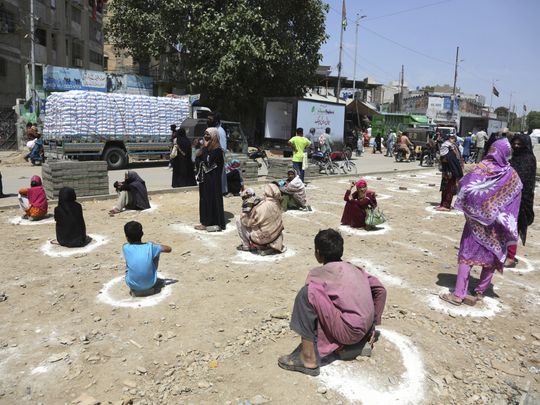
Karachi: Doctors are refusing to show up for work. Clerics are refusing to close their mosques. And despite orders to stay at home, children continue to pack streets across Pakistan to play cricket, their parents unwilling to quarantine them in crowded homes.
Pakistan is facing its biggest challenge ever: how to mobilise its broken state as the number of coronavirus cases rapidly spreads in the world’s fifth most populous country.
More than ever, the epidemic is showcasing weaknesses in the government, and the tensions between it and the country’s powerful military. Many within the country’s clerical establishment have refused to help, rejecting calls to limit mosque gatherings and bringing together at least 150,000 clerics from around the world this month in a religious gathering that helped spread the virus.
By Thursday afternoon, Pakistan’s cases had risen to 1,098, up from some 250 a week ago. Eight deaths have been reported. But many fear that the real numbers are much higher because of a lack of testing and, in some cases, suppressed information.
Already, Pakistan was struggling to provide electricity, water and adequate health care to its 220 million people. Diseases that have been controlled elsewhere, like rabies and polio, still persist here.
In recent weeks, as the coronavirus’ march across the globe was intensifying, Prime Minister Imran Khan played down its dangers. Pakistani officials bragged that the country was virus-free, but little was being done to set up testing anywhere.
Khan rejected calls from health care workers and provincial officials to enforce a lockdown, saying it would ruin the economy. Instead he urged citizens to practice social distancing and ordered everyone back to work, many returning to the sweltering, cramped factories that are the backbone of the economy.
Finally, the military stepped in Sunday and sidelined Khan, working with provincial governments to deploy across the country and enforce a lockdown. They erected a maze of military checkpoints in cities like Karachi and sent baton-wielding police officers to violently disperse crowds.
But the action may be too late. Doctors and nurses are refusing to come to work, fed up with the weak initial response to contain the virus’ spread.
And the extremist clerics who often heckle or march against the civilian government, with the tacit approval of the military, are refusing to help. They largely ignored Khan’s call to limit Friday prayer gatherings. And even after the military deployed to try to enforce a lockdown, several clerics made videos that went viral in recent days, urging Pakistanis to come back to the mosques to worship.
A gathering of more than 150,000 people was held this month on the outskirts of Lahore by Tablighi Jamaat, one of the world’s largest proselytising groups. The event was eventually called off at the urging of officials, but the participants had already come, sleeping and eating in close quarters.
The gathering proved a perfect transmission point, infecting indeterminate numbers of Pakistanis, at least two Kyrgyz citizens and two Palestinians who flew home and introduced the virus to the Gaza Strip. A similar gathering of Tablighi Jamaat in Malaysia infected more than 620 participants who then returned to dozens of countries across Southeast Asia.
In Pakistan’s capital, Islamabad, doctors and nurses at the Pakistan Institute of Medical Sciences, known as PIMS, who were tasked with screening coronavirus patients threatened to walk off the job this week if the government did not provide them with basic equipment like masks and gloves, which they received only last week.
While many of his colleagues called in sick this week, refusing to work as the virus surges, one doctor said he would continue to scrub in every day.
“We have no other way. We just can’t think about it. If we don’t fight it, who will?” the doctor said, adding that morale was low among his colleagues. “So we tell each other, ‘Our profession is sanctified from God. God will protect us.’ But those are just words.”
If the virus spreads much further, Pakistan’s entire health care system may melt down. In Karachi, a port city of some 20 million, there are only 600 beds in intensive care wards. There are 1,700 ventilators across the country, and last week, there were only 15,000 N95 masks for doctors and nurses, officials said.
“We don’t even have anti-rabies vaccines. How can we deal with thousands of people who will come here for coronavirus treatment?” said one doctor at a state-run hospital, who also complained that they had not been issued protective gear. As a government employee, the doctor had been barred from talking to the media and requested anonymity to express concerns.








